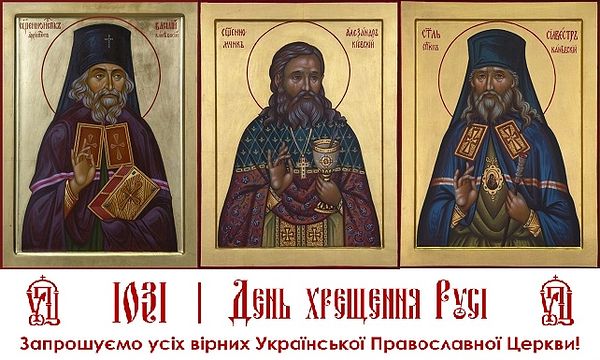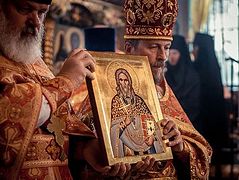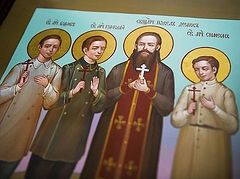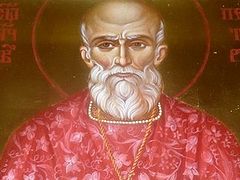Kiev, July 18, 2019
The feast of the Baptism of Rus’, celebrated every year on July 28, the day of the Baptizer of Rus’ and Equal-to-the-Apostles St. Vladimir, draws together thousands of faithful Orthodox Christians from throughout Ukraine and abroad to glorify God for His great mercy in sending the true faith to the lands of ancient Rus’.
This year’s celebration will be especially grace-filled and joyous, as the Ukrainian Orthodox Church will also glorify three new saints at the Divine Liturgy on the day.
On March 19, the Commission for the Canonization of Saints of the Ukrainian Orthodox Church met at the Kiev Caves Lavra to consider material on the glorification of four 20th century saints: Bishop Sylvester (Malevansky) of Kanev (+ 1908) and Archbishop Vasily (Bogdashevsky) of Kanev (+ 1933), Archpriest Alexander Glagolev (+ 1937), and Priest John Mogilev (+ 1918).
Both Bp. Sylvester and Abp. Vasily served as rectors of the Kiev Theological Academy, and Fr. Alexander as a professor there.
On April 3, the Holy Synod of the Ukrainian Church canonized Fr. John Mogilev as a local saint of the Kamensk Diocese, and Bp. Sylvester, Abp. Vasily, and Fr. Alexander as local saints of the Kiev Diocese, included in the Synaxis of Saints of the Kiev Theological Academy.
On the feast of the Baptism of Rus’, the canonization of the Kiev Academy saints—Bp. Sylvester, Abp. Vasily, and Fr. Alexander—will be liturgically celebrated.
***
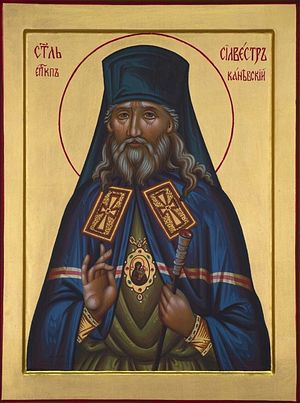 Photo: news.church.ua St. Sylvester, Bishop of Kanev (+ 1908) was born on January 9, 1828 in a priest’s family in the Volyn Province. He graduated from the Volyn Theological Seminary in 1847, after which he was married and ordained a priest, though his wife died during childbirth in 1850.
Photo: news.church.ua St. Sylvester, Bishop of Kanev (+ 1908) was born on January 9, 1828 in a priest’s family in the Volyn Province. He graduated from the Volyn Theological Seminary in 1847, after which he was married and ordained a priest, though his wife died during childbirth in 1850.
In 1853, he entered the Kiev Theological Academy, and three years later took monastic vows. He graduated from the Academy in 1857, after which he began teaching there and was later appointed inspector. His contemporaries note that for him, all students, good and bad, were equal.
He immersed himself in theological works and published the 5-volume The Experience of Orthodox Dogmatic Theology from 1878 to 1891. In 1883, he was elected as rector of the Academy and was consecrated as a bishop on January 20, 1885. St. Sylvester greatly advanced the Academy during his 15 years as rector.
His contemporaries note that in him they saw the ancient ideal of a saint—both a teacher of faith and a model of true piety. He was deeply humble and led an ascetic life. In addition to his duties as rector, he also took care of orphans from the Kiev-Podoslky Theological School and never refused to help the poor.
The last years of his service as rector were overshadowed by a number of student riots, and he resigned in 1897 for health reasons. Being the first vicar of the Kiev Metropolis, he was administrator of the Kiev Hermitage-St. Nicholas Monastery.
St. Sylvester retired in 1906 and went on to live a secluded life, leaving his cell only for worship. He celebrated his final Liturgy on the feast of Nativity in 1907. After that, despite his loss of vision, he constantly attended services at the Metropolis center. He reposed in the Lord on the night of November 11-12, 1908.
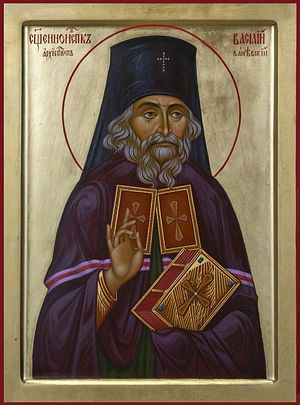 Photo: news.church.ua St. Vasily, Archbishop of Kanev (+ 1933) was born on October 19, 1861 in the family of a priest in the Volyn Province. He graduated from the Volyn Theological Seminary and later the Kiev Theological Academy. He defended his master’s thesis in September 1890. He later taught philosophy and New Testament at the Kiev Academy and served as inspector.
Photo: news.church.ua St. Vasily, Archbishop of Kanev (+ 1933) was born on October 19, 1861 in the family of a priest in the Volyn Province. He graduated from the Volyn Theological Seminary and later the Kiev Theological Academy. He defended his master’s thesis in September 1890. He later taught philosophy and New Testament at the Kiev Academy and served as inspector.
He was ordained as a priest in September 1910 and took monastic vows with the name Vasily in September 1913. In July 1914, he was elected rector of the Kiev Academy and was consecrated to the rank of bishop in August. St. Basil served as rector during the Academy’s most difficult years, though he always extended a helping hand to all in need.
In 1921, he signed the appeal of the bishops of the Ukrainian Church to the faithful not to accept the false 1921 council that declared autocephaly.
On April 4, 1923, St. Vasily was arrested and deported for refusing to join the Renovationists, though he was released in August after the petition of the Supreme Church Council. In 1925, he was elevated to the rank of archbishop and worked hard to resist various Church schisms.
In the last years of his life, his health deteriorated sharply and in his old age, he was in a difficult financial situation. His death on February 26, 1933 was especially instructive for the faithful. Despite his serious illness, with his last bit of strength he went to the All-Night Vigil with the words: “I want to die in church.” He fell and reposed in the Lord on the way to church.
His body was immediately taken to a nearby monastery where the brotherhood celebrated the Vigil over his body. His death was perceived as the death of a righteous man.
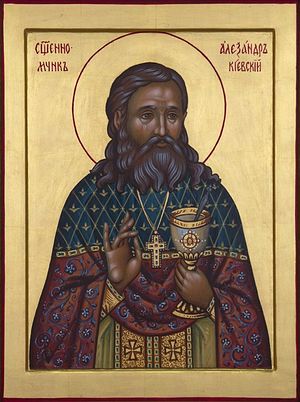 Photo: news.church.ua St. Alexander Glagolev (+ 1937) was born on February 14, 1872 in the family of a priest in the Tula Province. He graduated from the Tula Theological Seminary and the Kiev Theological Academy, where he was known as the best student. He defended his thesis and was awarded the degree of candidate of theology.
Photo: news.church.ua St. Alexander Glagolev (+ 1937) was born on February 14, 1872 in the family of a priest in the Tula Province. He graduated from the Tula Theological Seminary and the Kiev Theological Academy, where he was known as the best student. He defended his thesis and was awarded the degree of candidate of theology.
He married in 1899 and had three children. He taught Biblical Archaeology, Hebrew, Old and New Testaments, and Homiletics at the Academy. In 1900, he was awarded the degree of master of theology and the title of associate professor for his work, The Old Testament Biblical Teaching About Angels: The Experience of Biblical and Theological Research.
He was ordained to the priesthood in 1903 and elected as rector of the Academy in 1907, though he was not approved by the Holy Synod. He later temporarily served as rector after the arrest of St. Vasily in 1923. After the closure of the Academy, St. Alexander continued teaching privately.
He was an outstanding theologian and knew 18 ancient and modern languages. His scientific and theological heritage consists of more than 130 publications. Contemporaries remember him as a good shepherd, never turning away anyone in need of spiritual or material help. He once saved a young girl from suicide.
He was first arrested in 1931 but was released after five months. In 1936, he and his family were evicted from their home, leaving them to settle under bell tower of the Church of St. Barbara, where he slept on a large chest between services. Many have testified that St. Alexander began to display a special spiritual power at this time, living between Heaven and earth.
St. Alexander was arrested again on October 20, 1937, when he was 65 years old, and spent 36 days in prison. He was interrogated 18 times, accompanied by torture each time. Hieromartyr Alexander died on November 25, 1937 during an interrogation.
Follow us on Facebook!

